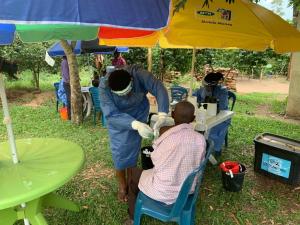Uganda tackles Ebola outbreak through several response Activities
Kasese, 17th June 2019:- The Ebola Virus Disease (EVD) outbreak that was declared on 11th June 2019 after detection of the disease in a 5-year-old boy has put Uganda’s experience in managing hemorrhagic fevers and the ten-months of preparedness effort under the spotlight. Anxious, yet ready, health workers are responding appropriately to the glare.
Every day, teams of health workers flash out to different communities to respond to the outbreak that now has 96 direct contacts that must be monitored for 21 days before they are declared free of the disease. Community anxiety and expectations are also high which has increased demand for information and services such as vaccination that started on Saturday.
“Ebola is now a reality in our midst. We need thorough calmness of everyone. Our strategy remains prevention, early detection and appropriate response,” said Dr Jane Ruth Aceng Uganda’s health Minister while addressing frontline health workers in Kasese after she declared the outbreak last week.
Disease surveillance in communities, at health facilities and at border entry points is one of the critical components of the strategy that is being implemented rigorously and with retrospection of regret, because of the 5-year-old index case together with his family, managed to evade detection and reached Kagando hospital.
However, that is neither surprising nor unexpected because of the people in this area that stride the two countries and are closely linked through various relationships such as blood, trade, religion, culture or marriage. Indeed, the porous border and the hundreds of informal crossing points imply that health workers stationed at gazetted entry points can hardly be blamed for the spillage.
In response, health workers have set up an alert management desk and are listing contacts and following all people who came into contact with the patients at Kagando, Bwera and Mpondwe. They are also conducting active case search in all health facilities in addition to monitoring all burials taking place in the district. They have mapped out all border crossing points around the Mpondwe and Bwera and through their tireless efforts, all the six people who came from DRC are now accounted for.
Village Health Teams (VHTs) who were oriented on EVD during the preparatory phase have boosted contact tracing, surveillance and health education in communities which has improved response time to alert cases. As Dr Aceng pointed out at the initial meeting, “time is of the essence right now. We must act fast and live up to what is expected of us” and the VHTs are striving to meet that expectation.
The laboratory team is also making its contribution which has improved the turnaround time of collection, transportation, testing and release of results to guide response activities.
While Uganda currently has no therapeutic care because there were no EVD cases, the ETU at Bwera is managing cases as and when they arise. Indeed, the two confirmed cases who unfortunately succumbed to the disease and the high-risk contacts were managed in the unit before referral to Beni for more care.
One of the new strategies of the EVD response is vaccination before and during outbreak which, as seen in DRC, has saved several lives. Vaccination of front line health workers and people exposed to the virus or who are potentially at great risk is now going on in the district. This is in addition to the 4,700 frontline health workers who were vaccinated in 13 districts during the preparatory phase.
Backing up these efforts is risk communication through which community groups such as transporters, local leaders, schools and security personnel, are being targeted with EVD prevention information. Local FM radio stations are also regularly alerting people about the danger in the community and providing useful tips on how to stay safe.
Yet as the WHO Representative Dr Yonas Tegegn Woldermariam pointed out at the beginning of the outbreak, “coordination and district leadership are factors that will determine how quickly this outbreak is contained”. So far, the Ministry of Health and district leaders are bearing this spotlight exceptionally well as well.
Health Promotion Advisor
Tel. : +256 414 335505
Cell: +256 772 507906
Email: sensasib [at] who.int (sensasib[at]who[dot]int)
Public Information Officer
Tel. : +256 313 335569
Cell: +256 786 497073
Email: mwebembezie [at] who.int (mwebembezie[at]who[dot]int)



